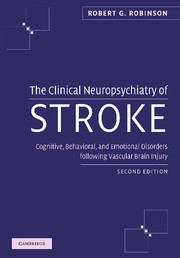 The Clinical Neuropsychiatry of Stroke
The Clinical Neuropsychiatry of Stroke Book contents
- Frontmatter
- Contents
- Preface
- Part I Introduction
- Part II Poststroke depression
- 5 Diagnosis of depression
- 6 Prevalence of depressive disorders
- 7 Phenomenology and specificity of depressive symptoms
- 8 Natural course of depression
- 9 Delayed-onset depression
- 10 Relationship to lesion location
- 11 Relationship of depression to cerebral dominance and structural asymmetries
- 12 Relationship of depression to bilateral hemisphere brain injury
- 13 Relationship of depression to physical impairment
- 14 Relationship to cognitive impairment and treatment
- 15 Relationship of aphasia to depression
- 16 Relationship of depression to social functioning
- 17 Relationship to premorbid risk factors
- 18 Mortality and treatment
- 19 Suicidal thoughts and plans
- 20 Biological markers
- 21 Mechanisms of poststroke depression
- 22 Treatment of poststroke depression
- 23 Prevention of poststroke depression
- Part III Poststroke mania
- Part IV Poststroke anxiety disorders
- Part V Other poststroke disorders
- Index
7 - Phenomenology and specificity of depressive symptoms
from Part II - Poststroke depression
Published online by Cambridge University Press: 01 October 2009
- Frontmatter
- Contents
- Preface
- Part I Introduction
- Part II Poststroke depression
- 5 Diagnosis of depression
- 6 Prevalence of depressive disorders
- 7 Phenomenology and specificity of depressive symptoms
- 8 Natural course of depression
- 9 Delayed-onset depression
- 10 Relationship to lesion location
- 11 Relationship of depression to cerebral dominance and structural asymmetries
- 12 Relationship of depression to bilateral hemisphere brain injury
- 13 Relationship of depression to physical impairment
- 14 Relationship to cognitive impairment and treatment
- 15 Relationship of aphasia to depression
- 16 Relationship of depression to social functioning
- 17 Relationship to premorbid risk factors
- 18 Mortality and treatment
- 19 Suicidal thoughts and plans
- 20 Biological markers
- 21 Mechanisms of poststroke depression
- 22 Treatment of poststroke depression
- 23 Prevention of poststroke depression
- Part III Poststroke mania
- Part IV Poststroke anxiety disorders
- Part V Other poststroke disorders
- Index
Summary
Phenomenology refers to the study of the structure of observable events. In the study of poststroke depression, phenomenology refers to the study of signs and symptoms which constitute the basis for the diagnosis of depression. Since depression occurs in the context of an acute medical illness, one might naturally wonder whether these depressions are like depressions in patients without acute illness or whether the acute medical illness interferes with our ability to diagnose depression using standard diagnostic techniques.
As indicated in the first edition of this text, we have conducted several studies examining the phenomenology of poststroke depression compared with the signs and symptoms of depression in patients without brain injury. We have also examined the frequency of specific symptoms of poststroke depression compared with stroke patients who are not depressed to examine whether these symptoms may reflect physical illness or depressive disorder. The only other investigators who have specifically examined the phenomenology of poststroke depression are Spalletta et al. (2005) and Gainotti et al. (1997, 1999). In Chapter 5, I compared the findings of Spalletta et al. (2005) with our findings and showed that both studies found, among patients with poststroke major depression, the frequency of virtually every symptom was significantly greater than non-depressed stroke patients (Table 5.2).
- Type
- Chapter
- Information
- The Clinical Neuropsychiatry of StrokeCognitive, Behavioral and Emotional Disorders following Vascular Brain Injury, pp. 60 - 74Publisher: Cambridge University PressPrint publication year: 2006


